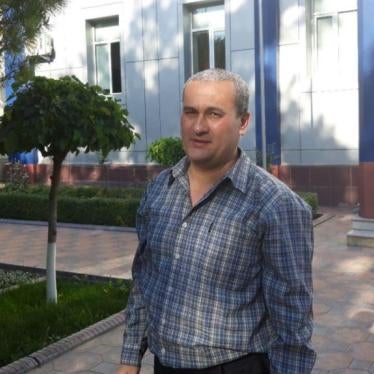Imagine a man has for years been nasty to his family. One day he starts being a little bit nicer to them and promises to get much better in future. Is this the time to give him a citizenship award for his slight change in behaviour?
That's essentially the question the European Union is facing over its relations with Uzbekistan. Some in Brussels think such a prize is already due, despite the fact that the central Asian country over decades has had one of the world's worst human rights records.
The EU's Generalised Scheme of Preferences (GSP) defines the bloc's trade relations and tariff cuts for low and lower-middle income countries, including Uzbekistan.
It also opens the door for additional incentives, dubbed GSP+, that grants countries even greater access to EU markets. But EU law is clear: GSP+ benefits are conditional on the ratification and implementation of 27 international human rights, labour, and environmental treaties.
Uzbekistan applied for GSP+ in June this year, but, despite some
improvements, the country still falls woefully short of these requirements.
Since the death of the brutal authoritarian leader Islam Karimov in 2016, the country has taken some modest steps to improve its human rights record.
Under president Shavkat Mirziyoyev dozens of political prisoners have been released, independent media activity has increased, and action was taken to limit forced labor in the country's cotton fields.
'Baby steps'
These are welcome changes, for sure, but they are baby steps. The government's pledges for reforms are mostly unfinished business.
Many people remain in prison on bogus charges, and media continue to self-censor out of fear.
Laws on civil society and demonstrations fall short of international standards. More worryingly, criminal provisions widely used to lock up thousands of critics under Karimov, including broad charges of extremism and treason, are still on the books.
Defamation and insult remain criminalised.
Despite a 2018 decree that reduced the responsibilities of Uzbekistan's security services, they retain enormous power and continue to use these abusive provisions.
Earlier this year, a former Uzbek diplomat, Kadyr Yusupov, and a former journalist of a defence ministry newspaper, Vladimir Kaloshin, were convicted on treason charges to lengthy prison sentences following closed trials marred by procedural violations and credible reports of torture while in detention.
In responding to Uzbekistan's GSP+ bid, the EU commission is now tasked to check whether there are serious failures in the country's effective implementation of core human rights treaties. Uzbekistan has ratified all the conventions required to join the programme.
But in-depth assessments by UN expert bodies confirm that key provisions remain unmet.
UN unimpressed
In April this year, the UN Human Rights Committee said it was concerned by Uzbekistan's repeated failure to implement its recommendations and continued restrictions on peaceful assembly and freedom of association.
It urged the government to bring its torture definition and its counter-extremism law in line with its international obligations.
In 2019, the UN Committee Against Torture raised concerns over "widespread, routine torture and ill-treatment" in detention sites, and the lack of compliance with fundamental legal safeguards during arrest and detention.
The EU Commission should give due weight to these independent, international assessments and acknowledge that, despite some recent progresses against a very low baseline, there are still serious failures in Uzbekistan's compliance with the treaties listed in the GSP regulation.
Brussels should clearly identify and publicly announce time-bound benchmarks that Uzbekistan should meet to address major deficiencies in its compliance record.
They should include releasing all those convicted on politically-motivated charges; fulfilling pledges to rid the country's criminal code of abusive provisions; and bringing its definition of torture, its NGO code, and its law on peaceful assemblies in line with international standards.
In addition, Uzbekistan should be required to fully abolish the practice of all forced labor in its cotton fields.
If it decides to fast-track Uzbekistan's access to GSP+ and override its own criteria, the EU should not pretend that the routine, biennial EU reporting on GSP+ would be enough to address Tashkent's continued failures to meet its rights obligations.
At the very least, the commission should set up a dedicated monitoring process, with the involvement of local and international civil society groups, to ensure greater transparency on benchmarks and recommendations, as well as to follow-up on the commitments of the Uzbek government to remedy failures identified.
Applying for the EU's GSP+ is a clear demonstration of president Mirziyoyev's ambition to reform the country's economic structures to boost growth and trade ties.
The EU should support this process in a way that benefits everyone in Uzbekistan by using its leverage to ensure Tashkent upholds the international human rights standards it has signed up to.
A lot of hard work remains to be done for Uzbekistan to deserve Brussels' reward.










